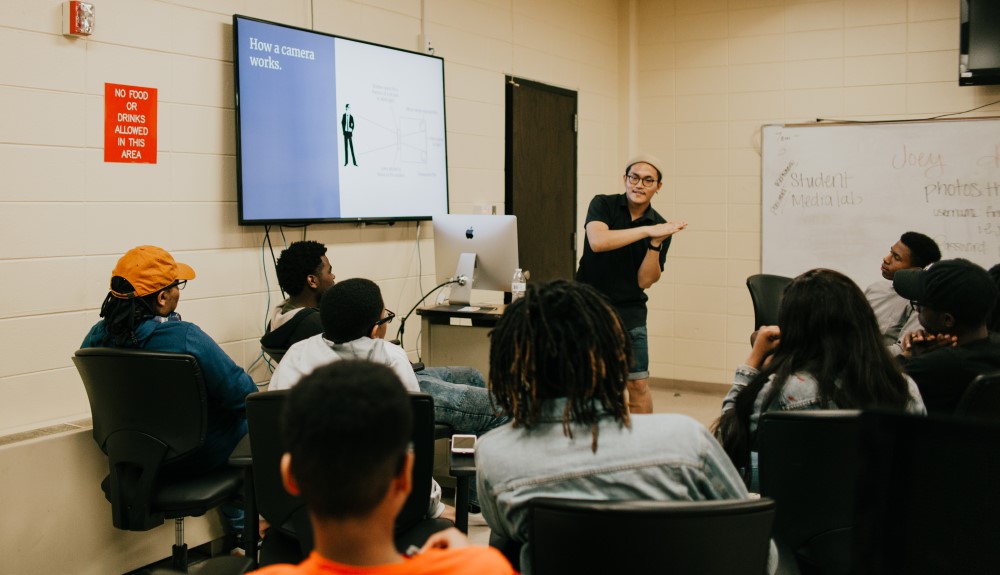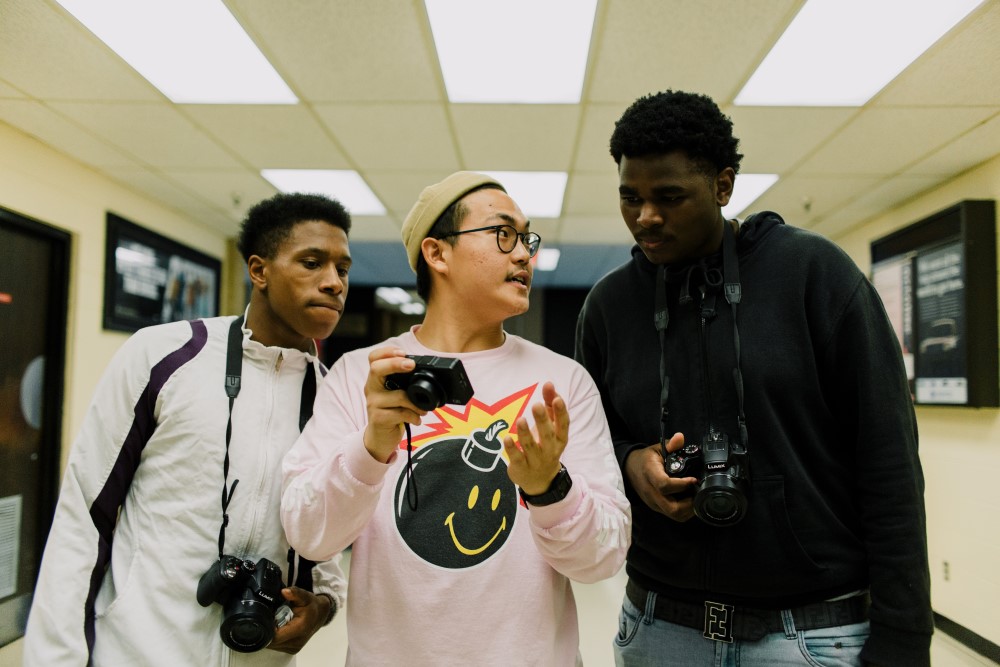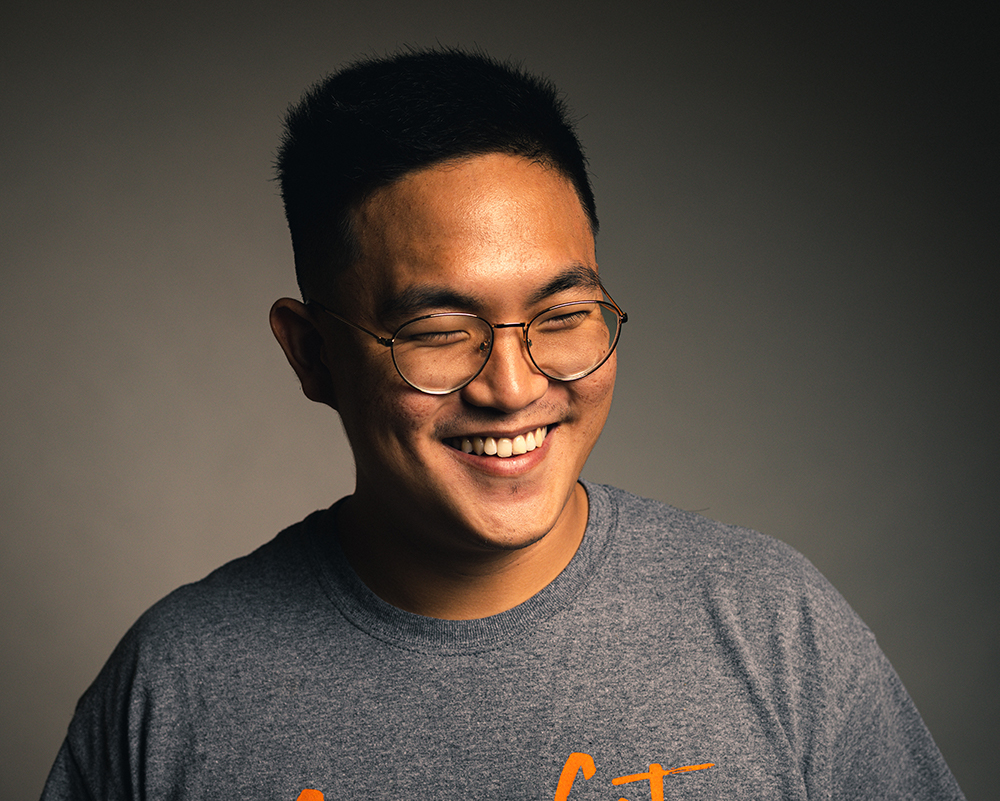Service Dossier Spotlight: Joseph Park, ECP Fall 2020
The staff at CCELL chose Joseph Park for its inaugural Engaged Citizen Program's Fall 2020 Service Dossier Spotlight.
Joseph, known affectionately as Joey, embodies the Engaged Citizen Program's mission of supporting students that significantly engage their communities to address critical community-identified needs. Joey, an interdisciplinary major with minors in African and African-American studies, photography, and sociology, has explored his myriad of academic passions through service as a volunteer at a local community garden. His dedication to gardening, a skill rooted in the bond with his mother, inspired him to pursue service-learning and by extension, the Engaged Citizen Program. His courses include HORT 2525: Organic Gardening and Sustainable Crop Production and AAAS 3901: Directed Reading and Research in African and African-American Studies—the latter contract-optioned as service-learning through CCELL.
Joey's service stems from an organic friendship with James "Jay" Jordan, the founder and director of GREAUX LSU—a partnership at Front Yard Bikes, a community bike shop (that also offers youth programming) within a food desert in South Baton Rouge. When Jordan's project sprouted in 2018, Joey was planted by his side building six greenhouses and planning the first season's worth of vegetable crops. Their harvest has been bountiful, producing carrots, beets, kale, broccoli, beans and cauliflower for local residents.
Joey's unwavering toil was not lost on Jordan, who described his budding friend as "exuberant, committed, and always ready."
"I noticed that he had received the message about the importance of the work we were doing by the way he devoted his time and energy to supporting the project," Jordan recalled. "He was always thinking about what we can do to grow the most amount of food possible, not for me but for the same people that I care about. We care about the same people and we're doing the same work."
When asked to describe why Joey's commitment to the community has yielded such positive results, Jordan offered compelling reasons:
"He engages with the community because he cares," Jordan emphasized. "He's really focused on righteousness. If Joey sees a pathway to doing something important, he doesn't have to think about it. He's already [moving] to help."
CCELL: In your own words, what is an Engaged Citizen?
Joey: An engaged citizen is a selfless person who uses their free time to establish relationships to help and influence others to address community needs and social issues.

Photo provided by Joseph Park.
C: All of your 100+ service hours consists of voluntary fieldwork with the Ronald E. McNair Research Scholars program at Front Yard Bikes. How did you get started working with this program?
J: I started working with this program when I became involved in community gardening after meeting Jay, who led a gardening program with elementary students. (My friendship with Jay is great and insightful; he even persuaded me to learn how to skateboard!)He also influenced me to use the gardening experiences I had with my mother [so that I could] spend my time in the community to teach others around me, especially the youth. After trying to figure out how to implement change in the first two years of my college experience, gardening was an epiphany and became my avenue to [affect] social change. This passion for change influenced me to spend my free time in the gardens to establish a trustworthy relationship with the students and community.
C: What do you enjoy most about volunteering at this community garden?
J: The one thing I enjoyed the most was the relationship I was able to build with students. The friendly rapport I had with specific students made it enjoyable to come volunteer. I also enjoyed the curious kids that gravitated towards the garden with questions or to just come say hey to me. I miss when students would ask me to harvest a certain crop their grandmother or family member wanted to cook, and I would always let the students help select and harvest the plant they wanted to gather. The genuine conversations with community members and students that happened around the garden is the most enjoyable aspect about volunteering at the community garden.
C: You said you missed students interacting with you at the gardens. Did you have to adjust your service in the community because of COVID-19? If so, how?
J: COVID -19 impacted my family’s business to where my mother needed my help daily to operate her business. Due to COVID-19 my mother lost her employees and it became more difficult to find/hire reliable people to work from 4am-10am. This impacted my personal time to be more involved in the community, so sadly I [spent less time volunteering] in the community compared to last year. Although, I still went to the garden right after the shutdown, due to health risks I was often alone at the garden. But once school resumed, it became very difficult to keep up with the class assignments and maintain the garden daily.
Due to more remote learning responsibilities and family priorities, it has been very difficult to adjust my service in the community. However, I have been back to the garden a handful times this past summer; but, I’ve seen less students come and be less engaged due to heat conditions and mask discomfort. COVID-19 also impacted the way I interact with students in the garden; I have had to change my hand-on methods due to social distancing mandates. Since, this is my last semester and my first time taking 18 hours, I am using my last semester to focus on graduating and organizing post-graduation plans.
C: We are proud of your service to the community, to your family, and to yourself! What have you learned about the community that you serve as they responded to the COVID-19 pandemic?
J: Thank you! I have learned that the program I volunteer for became very proactive and used their networks and resources to help transport food to their community members. Due to the global pandemic, the program focused less on their instructive curriculum and focused on community engagement by making sure families are receiving breakfast and lunch during unprecedented times. After the quarantine, they then tried transitioning onto online instruction, but I am not sure how that translated for the students due to their original hands-on curriculum.
C: Speaking of curriculum, why did you choose to take service-learning classes—since your interdisciplinary studies curriculum does not require it?
J: I chose to take a service-learning class because I thought it would be fun to be more interactive with the community in exchange for class credit. Since I was heavily involved in the community gardens, I enjoyed being more hands-on with organizing and planning the service-learning portion of the Horticulture 2525 course. I also believe, more courses should offer service-learning options because it is important to bridge the gap between communities and academic institutions. I like how service-learning courses tie the curriculum with reality and [show] how the theoretical is found in the reality of situations in everyday life.
C: What did you most enjoy about the HORT 2525: Organic Gardening and Sustainable Crop Production (taught by Dr. Carl Motsenbocker)?
J: I enjoyed it the most because I was exposed to various gardening methods that were shared with the community. Although we could have more time with service learning in the curriculum, I took away a great experience in help organizing the service-learning portion in my HORT class.
C: What have you learned from participating in your service-learning courses?
J: I have learned that service-learning requires a great amount of planning and communication in order to [these types of] opportunities. Also, I learned that effective service-learning requires a trustworthy relationship between both groups that share similar agendas/goals and have consistent communication.
C: How have your service and service-learning experiences made you an Engaged Citizen?
J: My service and service-learning experiences brought more opportunities in my reach the more I became involved in the community. These opportunities allowed me to build strong relationships with other community organizers to become more engaged in my community to help address critical needs. But most importantly, the service-learning experiences allowed me to meet people from various backgrounds and interact with others allowed me to be an engaged citizen.

Photo provided by Joseph Park.
C: You have built strong relationships outside of the community garden as well. You've also volunteered with The Walls Project Future FundsTech Academy Digital Photography program. We talked extensively about your photography talent/skill and your Spring 2020 photo exhibition that was cancelled due to COVID-19. What was it going to be about?
Q: After seeing a senior showcase his personal portfolio in the LSU Union Gallery a couple years ago, I was inspired to showcase my personal work and photo projects I’ve worked on through my semesters during my senior year but structure it totally different than the gallery I saw. The title of the show was going to be “Keep On Moving, A Collection of Personal Memories" and showcase images I’ve intuitively created on the street and through my personal life in various places I have traveled to. My photography minor and passion in street photography inspired me to curate this gallery with all the knowledge I’ve gained through my college experience and share my work with the public in a tangible form.
After taking numerous courses in the Photography program at LSU, I learned how to use an analog medium of photography which inspired me to study and pay closer attention to light. I prefer to work with this analog medium, even though it is now replaced with digital cameras, mainly because I cannot see the images I capture immediately--which takes away the instant gratification digital cameras give to people. This method allows me to slow down, live in the moment, and listen closely to my intuition when pressing the shutter. This older medium captures light and exposes it onto film emulsion, making that second of reality into tangible existence.
You can view some of Joey's photos from his postponed exhibit in the gallery below:








